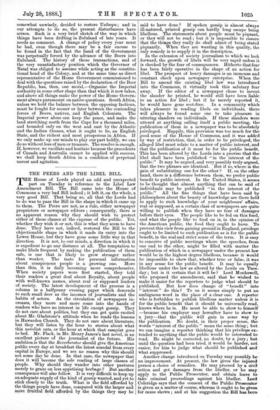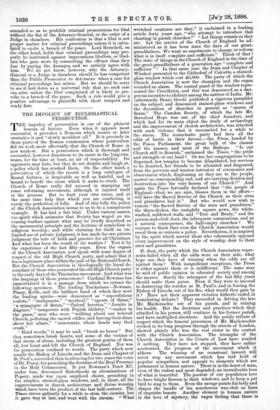THE PEERS AND THE LIBEL BILL.
THE House of Lords played an odd and unexpected part on Tuesday in reference to the Libel Law Amendment Bill. The Bill came into the House of Commons a very bad Bill indeed ; it left it, on the whole, a very good Bill. That being so, all that the Lords had to do was to pass the Bill in the shape in which it came up to them. The Peers are not, as a rule, either newspaper proprietors or newspaper editors ; consequently, there is no apparent reason why they should wish to protect either of these classes at the expense of the public. Yet, whether they wish it or not, this is what they seem to have done. They have not, indeed, restored the Bill to the objectionable shape in which it made its entry into the Lower House, but they have gone some little way in that direction. It is not, to our minds, a direction in which it is expedient to go any distance at all. The temptation to make libels frequent by making the publication of them. safe, is one that is likely to grow stronger rather than weaker. The taste for personal information about conspicuous people is a growing one. More than this, it is daily becoming more comprehensive. When society papers were first started, they told their readers a great deal about Royalty, about people with well-known names, about real or supposed leaders of society. The latest development of the process is a column in a halfpenny evening paper which descends to such small deer as the incomes of journalists and the habits of actors. As the circulation of newspapers in- creases, they more and more come into the hands of readers who have no interest in life except gossip. They do not care about politics, but they can get quite excited about Mr. Gladstone's attitude when he reads the lessons in Hawarden Church. They do not care about literature, but they will listen by the hour to stories about what this novelist eats, or the hour at which that essayist goes to bed. Mr. Flack, in Mr. Henry James's last novel, is an excellent picture of the journalist of the future. His ambition is that the Reverberator should give the American public every day at breakfast the latest scandal from every capital in Europe, and we see no reason why this should not some day be done. In that case, the newspaper that does it will become the sole reading of large classes of people. Why should they wander into other pastures merely to graze on less appetising herbage ? But another consequence will also follow. It is very difficult to keep up an adequate supply of the kind of gossip wanted, and yet to stick closely to the truth. What is the field afforded by the things people have done, compared with the larger and more fruitful field afforded by the things they may be said to have done ? If spoken gossip is almost always ill-natured, printed gossip can hardly long escape being libellous. The statements about people must be piquant, or they will not be read ; but it is impossible to ensure that the things they really do shall admit of being stated piquantly. When they are wanting in this quality, the only remedy is to supply it in the description. In the extension of society journalism to which we look forward, the growth of libels will be very rapid unless it is checked by the fear of consequences. Hitherto that fear has been fairly operative in the shape of an action for libel. The prospect of heavy damages is an immense and constant check upon newspaper enterprise. When the Bill to amend the existing libel law was introduced into the Commons, it virtually took this salutary fear away. If the editor of a newspaper chose to invent the slander he printed, he would still have been liable to an action for libel ; but if he merely reported it he would have gone scot-free. In a community which takes pleasure in reading libels on individuals, there will always be found some one to take pleasure in uttering slanders on individuals. If these slanders were uttered at anything calling itself a public meeting, the publication of them in a newspaper was to be absolutely privileged. Happily, this provision was too much for the good sense of the House of Commons, and it was added by way of restriction, that, in order to be privileged, the alleged libel must relate to a matter of public interest, and that the publication of it must be for the public benefit. This has been altered by the Lords into a proviso that the libel shall have been published " in the interest of the public." It may be argued, and very possibly truly argued, that the two phrases are identical. But if so, where is the gain of substituting one for the other ? If, on the other hand, there is a difference between them, we prefer public benefit to public interest. In the United States, it seems to be thought that almost anything that can be said of individuals may be published " in the interest of the public." All the fine things that have been said by philosophers about the beauty of knowledge are there held to apply to such knowledge of your neighbours' affairs, real or supposed, as a certain class of newspapers are quite willing to publish when they have no fear of damages• before their eyes. The people like to be fed on this food, and what the people like to feed on is, in the opinion of the American public, the food they ought to have. To prevent this view from gaining ground in England, privilege ought to be limited to such publication as is for the public benefit, in the real and strict sense of the term. It is easy to conceive of public meetings where the speeches, from one end to the other, might be filled with matter the publication of which in a newspaper under the present law would be in the highest degree libellous, because it would- be impossible to show that, whether true or false, it was in any sense for the public benefit. It may be equally libellous under the law as altered by the Lords on Tues- day ; but is it certain that it will be ? Lord Monkswell, who proposed the amendment, said that he wished to make it easier for the reporters to judge what should be published. But how does change of " benefit " into " interest" do this ? To us it seems simply to put an ambiguous word in the place of a clear one. A reporter who is forbidden to publish libellous matter unless it is for the public benefit that it should be universally read, knows where he is. He must be able to show to himself —because his employer may hereafter have to show to a jury—that the public will gain in some way by the publication. No doubt, in their proper sense, the words " interest of the public " mean the same thing ; but we can imagine a reporter thinking that his privilege ex- tended to anything that the public would be interested to read. He might be corrected, no doubt, by a jury ; but until the question had been tried, it would be harder, not easier, for him to judge what should be published and what suppressed. Another change introduced on Tuesday may possibly be an improvement. At present, the law gives the injured person a choice of remedies. He may proceed by a. civil action and get damages from the libeller, or he may apply to the Public Prosecutor, and obtain leave to take criminal proceedings against his libeller. Lord Coleridge says that the consent of the Public Prosecutor is given as a matter of course, whereas it ought to be given for cause shown ; and at his suggestion the Bill ban been amended so as to prohibit criminal prosecutions for libel without the fiat of the Attorney-General, or the order of a Judge in chambers. His contention is that a libel is not proper matter for criminal proceedings unless it is calcu- lated to excite a breath of the peace. Lord Herschell, on the other hand, holds that criminal proceedings may pro- perly be instituted against impecunious libellers, or libel- lers who gain more by committing the offence than they lose by paying the damages, and we entirely agree with him. We do not know, however, why the Attorney- General or a Judge in chambers should be less competent than the Public Prosecutor to determine when a case for criminal proceedings has arisen. But we should be sorry to see it laid down as a universal rule that no such case can arise unless the libel complained of is likely to pro- voke to a breach of the peace. Such a rule would give a positive advantage to plaintiffs with short tempers and ready fists.



































 Previous page
Previous page